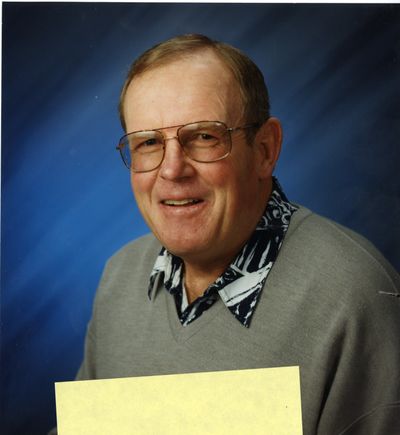Beloved Shadle, Rogers coach eulogized
Packed house celebrates life of legendary coach

Jim Paton’s life was so fascinating and touched so many lives, that it could have been made into a movie.
And so it was, in a poignant video on the big screen Saturday during his memorial service before a packed audience in the Shadle Park High School performing arts theater.
He died Jan. 1 from the ravages of Parkinson’s disease that he lived with for some 30 years.
“Jim was a unique individual,” said Bud Norris, a two-sport athlete and his friend at Washington State University. Norris delivered the eulogy before the remarkably crafted video depicted the story of Paton’s life.
“He was known as an athlete, coach and mentor,” Norris said, “but mainly as a friend. I lost a piece of my own history.”
Paton was an All-City football fullback at Shadle Park, who went on to start three years as a lineman at WSU. He was named among the Cougars’ top 50 players by The Spokesman-Review in series in 1997 and played professionally for a time in the Canadian Football League.
But it would be his work as a coach, first at Shadle Park and later as head baseball coach at Rogers, that would become his legacy.
There were some 800 photos in the video that ended with a television documentary at Avista Stadium that juxtaposed his coaching while struggling with the disease that ultimately took his life at age 68.
The quality big-screen effort shown during his memorial was the product of former Community Colleges of Spokane baseball coach Keith Snyder.
The audience was transported through the decades to Paton’s 1943 birth year in the DeLorean time machine from “Back To The Future.”
What followed was the photographic biography of Paton’s life from infancy, through his honored athletic and coaching careers interspersed throughout with family memories.
“He was a very intense person,” Norris said. “Opponents were victims of his ‘charity.’ ”
Coaching baseball at Rogers, however, became a love affair. Paton taught more about succeeding in life than succeeding in baseball. He became a surrogate parent at a school where 60 percent of the students, said Norris, come from single-parent families.
He ran marathons to show players what they could accomplish.
Former Pirates player Steve Mauro said in an earlier conversation that it took years for him to realize the impact Paton had on him.
“He had me on a leash and I hated him,” Mauro said of his high school years.
They rekindled their relationship not too long ago.
Paton refurbished Forsyth Field at Rogers, sinking pipes underground to improve drainage and assure the team could play on rainy spring days. He taught the value of work.
Paton put together youth all-star traveling teams to places like Russia, Australia, France and to the Baseball Hall of Fame in Cooperstown, N.Y.
Awards he received as a volunteer nationally and statewide are too numerous to mention.
“He made sure Rogers kids had the top equipment,” said Mike Schock, who was there near the end of Paton’s tenure. “He was a great ambassador for the game.”
At the conclusion of the memorial, those in the audience who had played for or coached with Paton were asked to come up on the stage. Some 70 did and kneeled in silent tribute.
“He was like our dad,” said Ron Brooks, who organized the memorial and is Shadle’s head baseball coach. “He pushed us and made us better people.”
His life was there on the big screen for all to see.